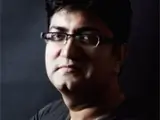| INTERVIEW | PRASOON JOSHI | | ||
| The Missionary | |||
| Rajiv Vijayakar It's not just Maa but all other songs that stand out in the film. To what do you attribute such a high level of inspiration? From the beginning we were very clear that my lyrics would be about every child, and not just about dyslexic children. Taare Zameen Par was a fantastic platform for me to go on a personal journey of self-exploration and discovery. I went back to my hazily-remembered childhood even though Amole had provided all the information of his research. Through this I was able to connect with the fears, the hopes and the insecurities of a child, and that came across. On a personal level, I was clear that I did not want anything preachy. I loathe preaching and so my treatment had to shun all that and still get the message across. If you notice, I did the same for my songs in Rang De Basanti. Incidentally there was a song on a mother's relationship with a child even in that film. I must also give due credit to the maturity that Shankar-Ehsaan-Loy brought into the film. They could have shown off their ustadi at compositions and sound but they went with the simplicity and ethos of the film instead - and that's very difficult. Shankar excelled as a singer too. You mentioned your daughter Aishaanya as a fount of inspiration too. For me, any new subject offered as a writer or a lyricist is a personal journey like I said earlier. My daughter is two-and-a-half years old and she helped me by her mere presence. I was subliminally watching her as she was also my first child and my first experience as a father. The film coming to me at perhaps the right time motivated me to understand my daughter better and I will definitely be a better parent to her because of it. Maybe I would have understood her gradually, but the film accelerated the process. Besides, once you write words becomes a commitment on paper. It's no longer unsaid. Like the stanza in Maa about the father coaxing the child to go higher on the jhoola is a metaphor - because only the mother can see the fears that the child cannot express to a callous father. Men, I think, are incapable of nurturing kids because man is selfish by nature. A woman is a nurturer and always sacrificing. A father can thus never replace a mother. Strong men and women have wept in the film, and profusely during Maa. The strength of emotions was inherent in the situation. I am very gratified at the results, which were only possible because of the wonderful script by Amole Gupte and his missionary zeal and Aamir Khan. Aamir Khan is a missionary even more than a superstar. He brooked no compromise in anything. It was just recently that an ad client of mine from Delhi called up and said that after she heard Maa she cancelled her son's admission to Doon School, one of the best and most expensive boarding schools in India. Her idea was - as always - to make her son become a successful man in a competitive world. But she told me, "I will now look after him myself!' If you pardon me for saying so, incidents like these are my biggest awards for writing the songs. It is interesting to note that a film that rightly questions unhealthy or unnatural competitiveness was offered to probably the only non-competitive lyricist in the business today. (Laughs) Well, I always say that career should be a by-product of passion. When an MBA like me took to ad copywriting it was for the same reason. I could have taken up a lucrative assignment in marketing with my degree. But I love my work in ads and my passion and mission was to get India's style of advertising noticed in the world. And I have succeeded. It is the same with my career as a lyricist and writer. The job of both is to communicate. In the specific case of Taare… I was lucky to find people who thought the way I did. How do you manage both your first profession and this one? When I am given a brief, I do not sit down and churn out a song. I muse and mull on what I am going to write. I absorb the story, the brief and everything I know or am told about. But research can only help to put you into a groove, but after that it's about first-hand experience and borrowing from one's own psyche. Par andhere se darta hoon main maa is an example of this, as most children are scared of the dark. I write the basic thought in solitude. After I am ready with that, it does not take long to frame the actual lyrics to the metre by the composer and to the satisfaction of the filmmaker. All this makes it necessary that I choose my work so that I am not working with people who want work done in a hurry. Aamir, Kunal Kohli and Rakeysh Omprakash Mehra are men who allow me this freedom and also make substantial cinema. Like I may tell someone now that I have less meetings and outstation trips in April - I am chairman of McCann-Erikkson across several countries and on their worldwide creative directors' roll besides being on the board of directors of Reliance - and they should be willing to want me enough to wait till then. I think that all such issues are a part of life - we all have angst against a lot of things. But we need a mood to focus and reflect upon them. You can tap into any of these also by interaction. When I wrote the line Main jheel hoon uksaa gayi hoon (I am a lake that is shackled from growth) in Mann Ke Manjeere it was a product of what I had read, heard and seen personally about women in our society. You continue to be a whiz in ads. What is the latest honour you have received? I have been designated the No.1 Creative Director in Asia by Media, the Numero Uno magazine in the ad world. And my Happydent ad has been declared among the topmost ten respected ads in the world. |
| |




















